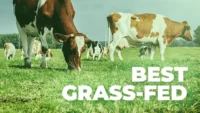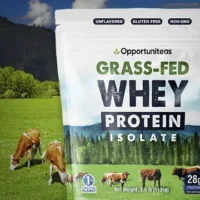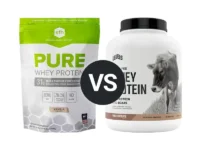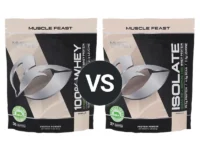Knowledge BaseYou're Questions Answered
Is grass-fed protein powder healthier than regular protein powder?
Grass-fed protein powder is marketed as a healthier alternative to regular protein powder due to the perceived benefits of consuming animal products from grass-fed sources. While there is some evidence to suggest that grass-fed animal products may be more nutritious than those from conventionally-raised animals, it is important to understand the limitations of this research.
Some studies have found that grass-fed animal products contain higher levels of beneficial nutrients such as omega-3 fatty acids, conjugated linoleic acid (CLA), and vitamins A and E, compared to conventionally-raised animal products (1, 2, 3). However, the differences in nutrient content may be relatively small and may not have a significant impact on health outcomes in the context of an overall healthy diet (4).
It is also worth noting that not all grass-fed protein powders are created equal. The nutritional content of grass-fed protein powders can vary depending on factors such as the animal's breed, age, diet, and living conditions. Therefore, it is important to choose a high-quality grass-fed protein powder from a reputable brand.
- Daley CA, Abbott A, Doyle PS, et al. A review of fatty acid profiles and antioxidant content in grass-fed and grain-fed beef. Nutr J. 2010;9:10. doi:10.1186/1475-2891-9-10
- Prache S, Cornu A, Berdagué JL. Comparison of the fatty acid composition of muscle and adipose tissue in carcasses from Charolais cattle finished on pasture or mixed diet. Meat Sci. 2005;70(2):267-273. doi:10.1016/j.meatsci.2004.12.001
- Cao Y, Wu H, Wang Y, et al. Comparison of the chemical composition, physical characteristics and sensory quality attributes of grass-fed and grain-fed beef. J Anim Sci Technol. 2018;60:33. doi:10.1186/s40781-018-0185-5
- Dhiman TR, Anand GR, Satter LD, Pariza MW. Conjugated linoleic acid content of milk from cows fed different diets. J Dairy Sci. 1999;82(10):2146-2156. doi:10.3168/jds.S0022-0302(99)75458-4
Related Questions
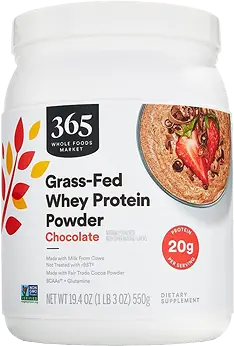
Your Answer
We are a participant in the Amazon Services LLC Associates Program, an affiliate advertising program designed to provide a means for us to earn fees by linking to Amazon.com and affiliated sites.
